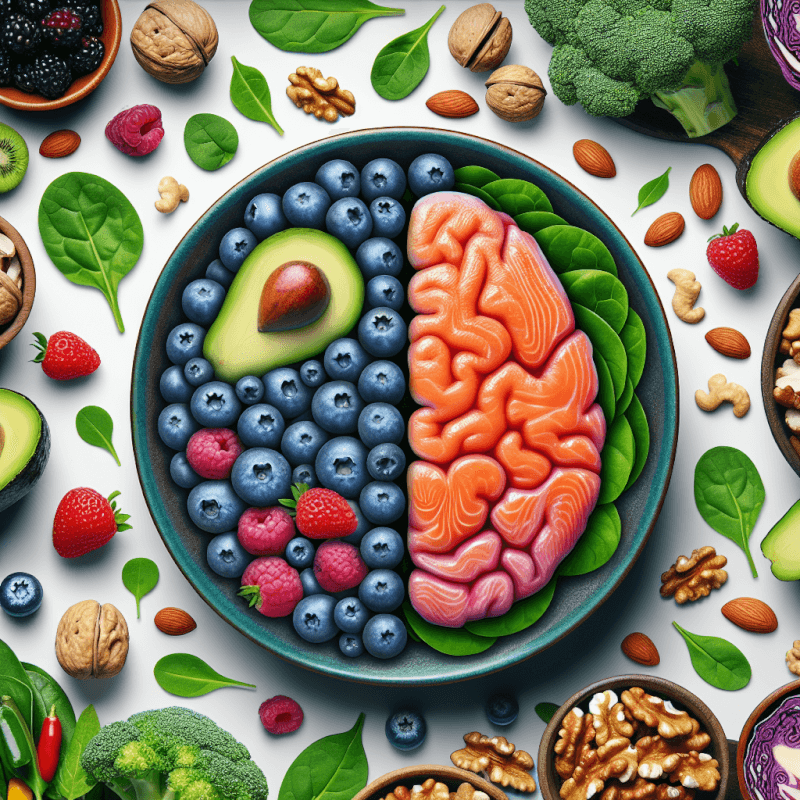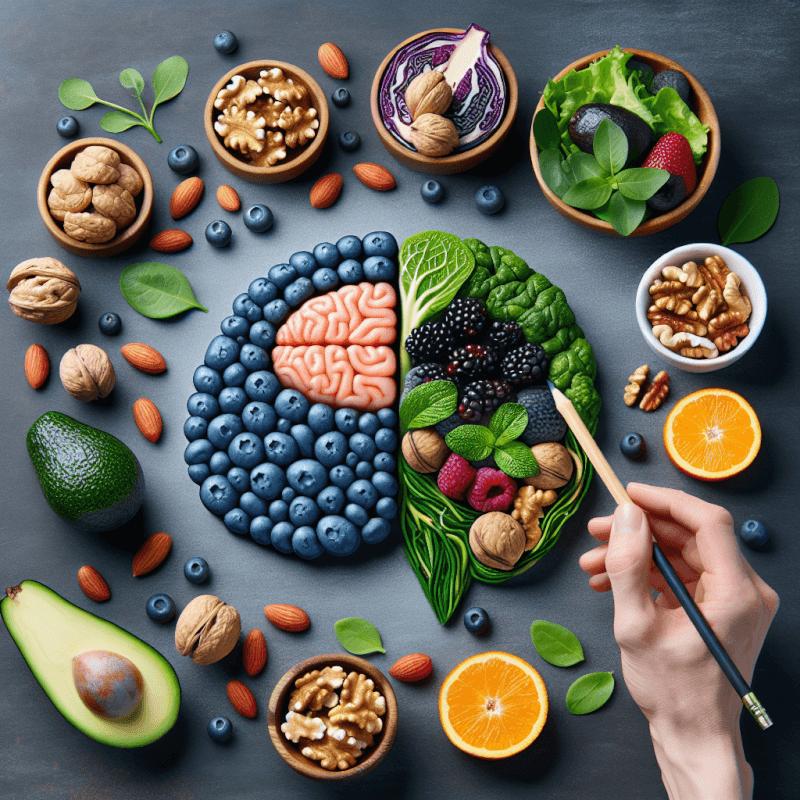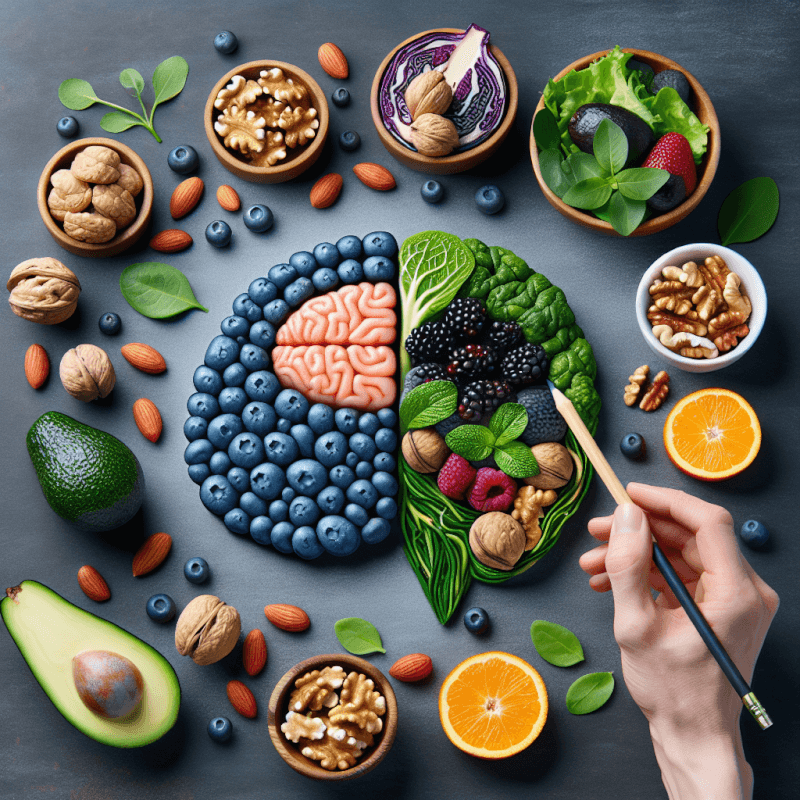As you journey through the stages of life, taking care of your brain health becomes crucial, particularly for Boomers and Gen Xers. With an abundance of information available, it can be overwhelming to pinpoint the foods that truly nourish and enhance your cognitive abilities. That’s why we’ve compiled a comprehensive guide to help you navigate this dietary maze and discover the best foods to support your brain health. From nutrient-rich fruits and vegetables to omega-3-packed fish and antioxidant-rich nuts, this article will unveil the top ingredients to incorporate into your diet for a sharper mind and a healthier brain. So, grab a pen and paper, because you won’t want to miss out on these brain-boosting foods!
Fruits and Vegetables
Berries
Berries, such as strawberries, blueberries, and raspberries, are not only delicious but also packed with essential nutrients that promote brain health. These colorful fruits are rich in antioxidants, which help protect the brain cells from damage caused by free radicals. Furthermore, berries contain flavonoids, which have been shown to improve memory and cognitive function. Whether enjoyed fresh, added to smoothies, or paired with yogurt, incorporating berries into your diet is a great way to boost brain health.
Leafy greens
Leafy greens like spinach, kale, and Swiss chard are a powerhouse of nutrients that can benefit brain health. These vegetables are high in antioxidants, vitamins, and minerals, such as vitamin K, vitamin A, and folate. They also contain beneficial compounds like flavonoids and carotenoids that have been linked to improved cognitive function. Including leafy greens in your diet can provide a wide range of health benefits, including a sharper memory and a reduced risk of developing cognitive decline.
Cruciferous vegetables
Cruciferous vegetables, including broccoli, cauliflower, Brussels sprouts, and cabbage, are another group of vegetables that are highly beneficial for brain health. These vegetables are packed with nutrients like vitamin C, vitamin K, and folate, which help support brain function. Additionally, cruciferous vegetables are a good source of compounds called glucosinolates, which have been shown to have anti-inflammatory and neuroprotective effects. Adding cruciferous vegetables to your meals can be a delicious and nutritious way to enhance brain health.
Avocado
Avocado is a versatile fruit that not only adds creaminess and flavor to meals but also provides numerous brain-boosting benefits. Rich in monounsaturated fats, avocados help maintain healthy blood flow to the brain and support cognitive function. They are also a great source of vitamin E, which is known to protect brain cells from oxidative stress. Incorporating avocados into your diet is as easy as spreading some on toast, adding slices to salads, or using them as a healthy fat substitute in recipes.
Tomatoes
Tomatoes, whether consumed fresh or cooked, are a fantastic addition to a brain-healthy diet. They are rich in lycopene, a powerful antioxidant that has been linked to a reduced risk of cognitive decline. Furthermore, tomatoes contain other beneficial compounds like vitamin C and vitamin K, which promote brain health. Including tomatoes in your meals can be as simple as adding them to salads, sandwiches, or pasta dishes, or enjoying a bowl of tomato soup.
Whole Grains
Oats
Oats are a nutritious whole grain that can provide numerous benefits for brain health. They are an excellent source of fiber, which aids in regulating blood sugar levels and promoting healthy brain function. Oats also contain vitamin E, B vitamins, and antioxidants, all of which contribute to improved cognitive performance. Starting your day with a hearty bowl of oatmeal or incorporating oats into baked goods and smoothies is a tasty way to incorporate this brain-boosting grain into your diet.
Quinoa
Quinoa is a versatile grain that is becoming increasingly popular due to its numerous health benefits. It is a great source of complex carbohydrates, which provide a steady release of energy to the brain. Quinoa is also packed with essential nutrients like fiber, iron, and magnesium, which support brain health and function. Whether used as a base for salads, added to soups, or enjoyed as a side dish, quinoa is an excellent addition to a brain-healthy diet.
Brown rice
Replacing refined grains with whole grains like brown rice is a simple yet effective way to support brain health. Brown rice is rich in fiber, which aids in stabilizing blood sugar levels and maintaining cognitive function. It also contains beneficial nutrients like B vitamins, magnesium, and selenium, which are essential for brain health. Including brown rice in your meals, such as stir-fries, grain bowls, or alongside protein and vegetables, can provide a nutritious and satisfying boost to your brain health.

Healthy Fats
Fatty fish
Fatty fish like salmon, trout, and sardines are an excellent source of omega-3 fatty acids, which are essential for brain health. Omega-3 fatty acids contribute to the formation and maintenance of brain cells and play a vital role in cognitive function. Regular consumption of fatty fish has been linked to a reduced risk of cognitive decline and improved memory. Incorporating fatty fish into your diet a few times a week can be as simple as grilling or baking the fish and serving it with a side of vegetables and whole grains.
Nuts and seeds
Nuts and seeds, such as almonds, walnuts, flaxseeds, and chia seeds, are packed with healthy fats and other beneficial nutrients for brain health. They are a great source of omega-3 fatty acids, vitamin E, and antioxidants, all of which support brain function. Additionally, nuts and seeds provide a good amount of fiber and protein, both of which help regulate blood sugar levels and promote optimal brain health. Enjoy a handful of nuts as a snack, sprinkle them on salads or yogurt, or incorporate them into homemade granola for a delicious brain-boosting treat.
Olive oil
Olive oil is a staple in a Mediterranean-style diet, which is known for its brain-boosting benefits. It is rich in monounsaturated fats and antioxidants, which help reduce inflammation and promote healthy brain function. Additionally, olive oil contains compounds that may help protect against cognitive decline and improve memory. Using olive oil in cooking, as a dressing for salads, or for drizzling over roasted vegetables is an easy way to incorporate this brain-healthy fat into your meals.
Protein-Rich Foods
Lean meats
Lean meats, such as chicken, turkey, and lean beef, are an excellent source of high-quality protein, which is essential for optimal brain health. Protein provides the building blocks for neurotransmitters, the chemicals that transmit signals in the brain. Including lean meats in your diet can help support cognitive function, memory, and overall brain health. Grilled chicken, roasted turkey breast, or a lean beef stir-fry are all delicious ways to incorporate lean meats into your meals.
Poultry
Poultry, including chicken and turkey, is a lean source of protein that can provide numerous benefits for brain health. It is rich in nutrients like vitamin B12 and folate, which play a crucial role in brain function and development. Poultry also contains amino acids that are necessary for the production of neurotransmitters, which are essential for optimal brain function. Enjoying a grilled chicken salad, roasted turkey breast, or a comforting turkey soup can be a tasty way to add poultry to your brain-healthy diet.
Beans and legumes
Beans and legumes, such as lentils, chickpeas, and black beans, are plant-based sources of protein that offer numerous benefits for brain health. They are high in fiber, which helps regulate blood sugar levels and supports brain function. Beans and legumes also provide a good amount of folate, magnesium, and antioxidants, all of which contribute to optimal brain health. Whether enjoyed in salads, soups, stews, or even as the base for delicious plant-based burgers, incorporating beans and legumes into your diet is a smart choice for brain health.
Eggs
Eggs have long been associated with brain health due to their nutrient-rich composition. They are a great source of high-quality protein and contain essential nutrients like vitamin B12, folate, and choline, which are all important for brain function. Choline, in particular, is crucial for the development and maintenance of healthy brain cells. Whether enjoyed as a classic omelet, poached or boiled, eggs are an easy and nutritious way to support your brain health.
Greek yogurt
Greek yogurt is a creamy and delicious source of protein that offers numerous brain-boosting benefits. It is packed with essential nutrients like calcium, vitamin B12, and probiotics, which support brain health. Probiotics, in particular, have been linked to improved cognitive function and a reduced risk of cognitive decline. Enjoying a bowl of Greek yogurt topped with berries and nuts or using it as a base for smoothies and dressings can be a tasty way to include this protein-rich food in your diet.

Antioxidant-Rich Foods
Dark chocolate
Dark chocolate, with a high percentage of cocoa, is a delicious treat that offers several brain-boosting benefits. It is rich in antioxidants, particularly flavonoids, which have been shown to improve cognitive function and protect brain cells from damage. Dark chocolate also contains small amounts of caffeine and other compounds that promote blood flow to the brain, providing a mental boost. Opt for dark chocolate with a cocoa content of at least 70% and enjoy a small piece as an occasional brain-boosting indulgence.
Green tea
Green tea is a popular beverage known for its numerous health benefits, including its positive impact on brain health. It is rich in antioxidants, specifically catechins, which have been shown to improve cognitive function and reduce the risk of neurodegenerative diseases. Green tea also contains a small amount of caffeine, which can provide a temporary boost in mental alertness. Sipping on a warm cup of green tea or enjoying it iced can be a refreshing and brain-boosting addition to your daily routine.
Turmeric
Turmeric is a vibrant, yellow spice that has been used for centuries in traditional medicine for its powerful health benefits. It contains a compound called curcumin, which has potent antioxidant and anti-inflammatory properties. Curcumin has been shown to cross the blood-brain barrier and has the potential to enhance brain function. Incorporating turmeric into your cooking, whether in curries, stir-fries, or as a seasoning for roasted vegetables, can be a flavorful and beneficial way to support brain health.
Walnuts
Walnuts are not only a tasty snack but also an excellent source of antioxidants and healthy fats that promote brain health. They are rich in polyphenols, which are powerful antioxidants that help reduce inflammation and oxidative stress in the brain. Additionally, walnuts are high in omega-3 fatty acids, vitamin E, and melatonin, all of which contribute to improved brain function. Enjoying a handful of walnuts as a snack, sprinkling them on salads or oatmeal, or incorporating them into baked goods are all delicious ways to reap the brain-boosting benefits of walnuts.
Vitamin-Rich Foods
Oranges
Oranges and other citrus fruits are well-known for their high vitamin C content, which offers several benefits for brain health. Vitamin C is a powerful antioxidant that helps protect brain cells from oxidative stress and promotes the production of neurotransmitters. Citrus fruits also provide fiber and other essential nutrients that support overall brain health. Starting your day with a refreshing glass of orange juice or incorporating citrus segments into your salads and desserts can be a tasty way to support your brain health.
Bell peppers
Bell peppers, particularly the brightly colored varieties like red, orange, and yellow, are packed with essential nutrients, including vitamin C and vitamin A. These vitamins have antioxidant properties that protect the brain from damage caused by free radicals. Additionally, bell peppers contain beneficial compounds like carotenoids and flavonoids, which have been linked to improved cognitive function. Enjoying bell peppers raw in salads, roasted, or sautéed in various dishes can provide a flavorful and brain-boosting addition to your diet.
Citrus fruits
Citrus fruits, such as lemons, limes, grapefruits, and tangerines, are not only refreshing but also offer several brain-boosting benefits. They are high in vitamin C, which is a potent antioxidant that helps protect brain cells from free radical damage. Vitamin C also plays a crucial role in the production of neurotransmitters, which are essential for optimal brain function. Squeeze some lemon or lime juice over salads, enjoy a grapefruit for breakfast, or snack on peeled tangerines to include these citrus fruits in your brain-healthy diet.
Spinach
Spinach is a nutrient-packed leafy green that can significantly benefit brain health. It is rich in vitamins A, C, E, and K, as well as folate, iron, and magnesium, all of which support brain function. Spinach also contains beneficial compounds like flavonoids and antioxidants that help protect brain cells from damage and improve cognitive function. Including spinach in your meals, whether in salads, smoothies, or as a sautéed side dish, is a delicious way to boost your brain health.
Eggs
Eggs are not only a great source of protein but also a rich source of essential vitamins that support brain health. They contain several B vitamins, including vitamin B12, which support the production of neurotransmitters and assist in memory and cognition. Eggs are also a good source of choline, a nutrient necessary for brain development and function. Incorporating eggs into your diet in various forms, from omelets to frittatas or simply boiled or scrambled, provides a nutritious and brain-boosting option.

Brain-Boosting Herbs and Spices
Rosemary
Rosemary is not only a popular culinary herb but also offers several brain-boosting benefits. It contains compounds that have been shown to improve memory and cognitive function. Inhaling the scent of rosemary has even been found to enhance memory and alertness. Utilize rosemary in your cooking by adding it to roasted vegetables, marinades, or incorporating it into homemade bread and sauces to enhance both the flavor and brain-boosting effects.
Sage
Similar to rosemary, sage is an herb that has been traditionally used for its brain-boosting properties. It contains compounds that have been linked to improved memory and cognitive function. Whether used as a seasoning for roasted meats, added to stuffing, or infused into teas, incorporating sage into your cooking can provide a delicious and beneficial boost to your brain health.
Turmeric
Turmeric, with its vibrant golden color, is not just a flavorful spice, but also offers remarkable brain-boosting benefits. It contains a compound called curcumin, which has potent antioxidant and anti-inflammatory properties. Curcumin has been shown to cross the blood-brain barrier and may have the potential to improve cognitive function and reduce the risk of neurodegenerative diseases. Adding turmeric to your cooking, particularly in curries, soups, and stews, is a flavorful way to incorporate this powerful spice into your brain-healthy diet.
Cinnamon
Cinnamon is not only a fragrant and delicious spice but also offers several brain-boosting benefits. It has been found to improve memory, cognition, and attention span. Cinnamon also contains antimicrobial and antioxidant properties that contribute to overall brain health. Sprinkle cinnamon on oatmeal, add it to smoothies or baked goods, or use it to spice up your morning coffee for a tasty and brain-boosting addition to your diet.
Hydration
Water
Proper hydration is essential for overall health, including brain health. Dehydration can lead to fatigue, loss of focus, and impaired cognitive function. Staying properly hydrated throughout the day is crucial for optimal brain function. Aim to drink at least 8 cups (64 ounces) of water per day, and more if you are physically active or in hot weather. Keep a water bottle handy and sip water throughout the day to stay hydrated and support your brain health.
Herbal teas
In addition to water, herbal teas can be a hydrating and brain-boosting beverage option. Certain herbal teas, such as chamomile, peppermint, and lavender, have calming properties that can help reduce stress and promote relaxation. Green tea, as mentioned earlier, is also a great option due to its antioxidant and cognitive-boosting properties. Enjoying a warm cup of herbal tea or green tea throughout the day is not only comforting but also a beneficial way to stay hydrated and support brain health.

Limiting Processed Foods and Added Sugars
Processed foods
Although convenient, processed foods are often high in unhealthy fats, added sugars, and refined carbohydrates, all of which can negatively impact brain health. Diets high in processed foods have been linked to increased inflammation and a higher risk of cognitive decline. To support brain health, it is important to limit the consumption of processed foods and focus on whole, nutrient-dense options instead.
Added sugars
Consuming excess added sugars can lead to chronic inflammation and impaired brain function. Studies have shown that diets high in added sugars are associated with a higher risk of cognitive decline and memory impairment. It is important to read food labels and be aware of hidden sugars in processed foods and beverages. Limiting sugary snacks, desserts, sugary drinks, and processed foods can significantly contribute to better brain health.
Meal Planning and Preparation Tips
Focus on a balanced diet
When planning your meals, aim for a balanced diet that incorporates a variety of brain-boosting foods from each category. Include a mix of fruits, vegetables, whole grains, healthy fats, protein-rich foods, and brain-boosting herbs and spices in your meals. This ensures that you are getting a wide range of nutrients that support brain health while providing a variety of flavors and textures in your diet.
Cook at home
Cooking at home gives you more control over the ingredients and cooking methods used, ensuring that you are preparing nutritious meals that support brain health. Experiment with new recipes and cooking techniques to keep meals interesting and enjoyable. Involve family or friends in the cooking process, making it a fun and social activity that promotes not only brain health but also overall well-being.
Try new recipes
Eating a brain-healthy diet does not mean sacrificing flavor and enjoyment. Explore new recipes that incorporate brain-boosting ingredients and experiment with different flavors and cuisines. Incorporate a variety of fruits, vegetables, whole grains, healthy fats, and herbs and spices into your meals. Trying new recipes not only keeps your meals exciting but also encourages diversity in your diet, ensuring you get a wide range of nutrients to support brain health.
By incorporating these brain-boosting foods into your daily diet and embracing a healthy lifestyle, you can support your brain health and overall well-being. Remember, small changes in your eating habits can lead to significant improvements in your cognitive function and long-term brain health. So, why not start today and give your brain the nourishment it deserves? You’ll not only feel sharper and more focused, but you’ll also be taking proactive steps towards a healthier future.



